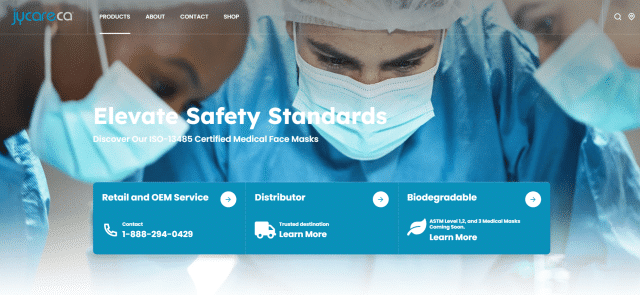
The medical device industry is critical in supporting healthcare facilities and medical professionals in delivering quality patient care.
Still, this does not mean the entire industry is all smooth-sailing. In fact, making sure that the supply chain for medical devices runs smoothly and reliably is one of the great challenges for all involved parties.

That’s why we’ll be considering the topic of supply chains and their challenges in this article, alongside the strategies that may possibly help overcome them. Interested? Then join us on this journey!
A well-functioning supply chain is essential to meet the increasing demand for medical devices and ensure their availability when needed. However, several challenges impede the seamless flow of medical devices throughout the supply chain.
In recent years, the global demand for medical devices has surged, driven ever higher by population growth, advancements in healthcare tech, and the increasing prevalence of chronic diseases.

This demand has led to supply imbalances, which in turn cause shortages or delays in acquiring essential medical devices. Such imbalances negatively impact healthcare facilities, snatching away their ability to provide timely and effective patient care and thus forcing people to lose trust in them, all of which accumulates in a downward spiral.
Strict regulatory requirements govern medical device manufacturing, distribution, and use to ensure patient safety and product quality.
Compliance with these regulations challenges medical device manufacturers, as non-compliance can result in product recalls, legal liabilities, and damage to their reputations.
Maintaining consistent quality control throughout the supply chain is crucial but can be complex due to the involvement of multiple stakeholders and diverse manufacturing processes.
Medical devices are often transported over long distances, crossing various borders and jurisdictions. This presents logistical complexities, including customs clearance, documentation, and adherence to transportation regulations.
Delivery or handling during transportation can lead to disruptions in the supply chain, impacting healthcare facilities’ ability to provide timely care to patients.
Effective inventory management is vital to balance the supply and demand of medical devices. However, challenges such as inaccurate demand forecasting, stockouts, and excess inventory can disrupt the supply chain.

Stockouts, in particular, can severely impact healthcare facilities, as they may need access to critical medical devices for urgent patient care.
The medical device supply chain involves various stakeholders, including manufacturers, distributors, healthcare facilities, and regulatory bodies.
Effective communication and collaboration among these stakeholders are essential to address challenges promptly and ensure a smooth flow of medical devices.
Local manufacturing of medical devices offers several advantages that contribute to a more efficient and reliable supply chain.

Innovative technologies and strategies are being adopted to address the challenges faced by the medical device industry and optimize supply chain operations.
Advanced data analytics tools help medical device manufacturers accurately forecast demand patterns, allowing them to align production and inventory levels accordingly. Predictive modeling enables proactive decision-making and reduces the risk of stockouts or excess inventory.
Blockchain technology ensures transparency and traceability across the supply chain. It enables secure recording and sharing of transactional data, enhancing accountability and reducing the risk of counterfeit products. By leveraging blockchain, stakeholders can quickly trace the origin and movement of medical devices, ensuring authenticity and safety.
Artificial intelligence (AI) algorithms can optimize inventory levels by considering historical data, current demand, and lead times. AI-powered automation streamlines inventory management processes, minimizing human errors and improving overall supply chain efficiency.
Digital platforms facilitate real-time communication and collaboration among medical device supply chain stakeholders. These platforms enable information sharing, inventory updates, and efficient coordination between manufacturers, distributors, and healthcare facilities, reducing response times and improving overall visibility.

JY Care is committed to leveraging innovative technologies and approaches to overcome supply chain challenges and deliver exceptional healthcare solutions.
JY Care utilizes state-of-the-art inventory management systems powered by advanced analytics. This ensures accurate demand forecasting, inventory optimization, and timely replenishment of medical devices.
Leveraging modern tracking technologies, JY Care provides real-time visibility into the status of shipments. This enables healthcare facilities to track their orders’ progress and accurately anticipate delivery times.
JY Care employs collaborative digital platforms that facilitate seamless communication and coordination between stakeholders. This ensures effective information exchange, swift issue resolution, and proactive supply chain management.
JY Care identifies improvement and optimization areas by analyzing supply chain data. These data-driven insights drive ongoing enhancements in their supply chain processes, ensuring reliability, efficiency, and customer satisfaction.

In today’s healthcare landscape, addressing supply chain challenges is crucial for the medical device industry to provide reliable, high-quality healthcare solutions.
Through local manufacturing, innovative technologies, and a commitment to excellence, trusted providers like JY Care are at the forefront of overcoming these challenges.
By offering “Made in Canada” medical devices and reliable supply chains, JY Care ensures that healthcare facilities and medical professionals have access to the essential medical devices they need.
Addressing supply chain challenges will remain a top priority as the medical device industry evolves. By partnering with trusted providers like JY Care, healthcare facilities and medical professionals can navigate these challenges and confidently deliver quality healthcare to patients.
To learn more about the medical device supply chain and the efforts to address shortages, visit the FDA’s page on Medical Device Supply Chain. Stay informed to ensure a reliable supply of medical devices for better patient care.